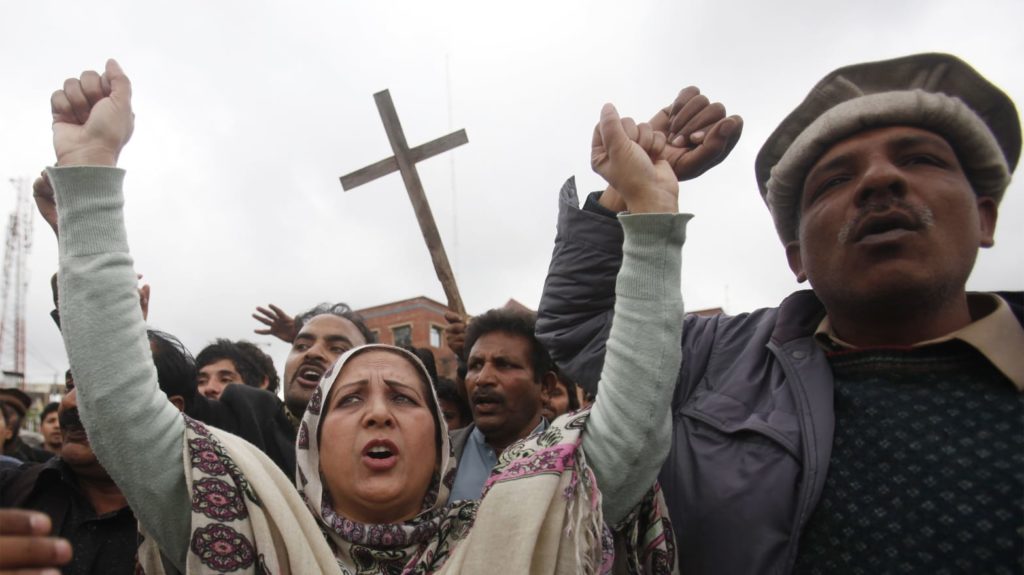Christians across the world are in prayer and mourning amid mounting challenges to religious freedom in Afghanistan. Placing this issue in the larger context of government abuse and persecution, the Ethics and Religious Liberty Commission (ERLC), the public policy arm of the Southern Baptist Convention (SBC), hosted a discussion titled, “Baptists and the Nations: Religious Freedom Challenges Around The Globe” on August 26.
ERLC invited Todd Lafferty, executive vice president of SBC’s International Mission Board; Paul Miller, professor of the practice of international affairs at Georgetown University’s School of Foreign Service; and Chelsea Sobolik, acting director of public policy at ERLC’s Washington, D.C. office to share their thoughts.
Miller described the situation in Afghanistan as “one of the greatest setbacks for international religious freedom that we’ve lived through. It’s very dramatic. We all know what the Taliban are and that they will not respect religious freedom or any human rights.”
Open Doors, which supports persecuted Christians around the world, ranked Afghanistan as the second most dangerous country to be a Christian pre-Taliban takeover. The situation now is even more tense as Christians across the country have gone into hiding.
However, the situation is not all dark as Lafferty expressed, “There’s great opportunity for the church to rise up and minister and serve during these crisis opportunities.”
In particular, entering Afghanistan can be extremely difficult for Christians. “This gives us an opportunity as a church to reach the nations,” Lafferty proposed. “We need to pray that Christians here would receive them [Afghan refugees] with open arms and see this as God’s appointed time, maybe a kairos moment in history, where we actually have an opportunity to minister to people that we would never be able to touch because they’re behind closed borders and hard to reach places.”
Sobolik added, “It can be tempting when we see these images and videos to feel utterly, utterly helpless, but we’re not.” She emphasized the importance of praying for all people in Afghanistan. “As Christians, we can get on our knees and pray on behalf of vulnerable people in Afghanistan and around the world who are facing persecution. We can also pray that those persecutors, the Taliban, that people would share the gospel with them, that they would come to know Christ as their savior.” She referenced the conversion of Saul, who by the grace of God stopped persecuting Christians when he became one.
As the world keeps watch over Afghanistan, Miller stressed the need to “pay attention beyond the day’s headlines and be aware of the world as it is. There are a lot of other emerging and important issues that may not feel like today’s crisis and yet they are deeply concerning, deeply worrying.”
In China, for example, the Chinese Communist Party (CCP) has re-written Biblical stories for its own materials. When Jesus encounters the woman caught in adultery, he says to the scribes and Pharisees in John 8:7, “’Let him who is without sin among you be the first to throw a stone at her.’” The CCP version, Lafferty explained, tells the story like this in a law and ethics textbook: “Jesus tells her, ‘You’re a sinner. I’m a sinner.’ And he stones her and he says, ‘No one is above the law.’” A man selling real Bibles was sentenced to seven years in prison.
Despite the intense persecution religious minorities face in China, again, Lafferty spoke hopefully. “They’ve destroyed church buildings but they won’t destroy the church because Jesus said he’s going to build his church, and so we know that will continue no matter what they do on the outside,” he said.
Another place of concern is Eastern Europe, particularly Hungary. Many American conservatives, such as Fox News Host Tucker Carlson and The Benedict Option author Rod Dreher, have held Hungary as a model of religious freedom and moral conservatism. Miller, however, questions the authenticity of Hungary’s image.
“Quite often in history, governments will use the language and the rhetoric of religion—Christianity or other religions—to borrow their moral legitimacy,” Miller explained. “In the case of Hungary right now, while it calls itself a Christian country and has tried to cultivate a culture of Christian norms… the prime minister has subverted the independence of the judiciary and the media, and has not allowed in refugees, and has said some pretty nasty things about them, and is walking the fine line of treating ethnic and religious minorities as second-class citizens. I don’t think any of that is Christian.”
Speaking of Eastern Europe more broadly, Lafferty observed, “It’s actually kind of a radical concept now to believe that there is a God, that there is one God, that Jesus died for our sins on the cross. This is really news to many people in this part of the world.” However, ending on a third hopeful note, he said, “It’s sounding like very good news to many who are hearing the gospel really for the very first time.”
No comments yet





